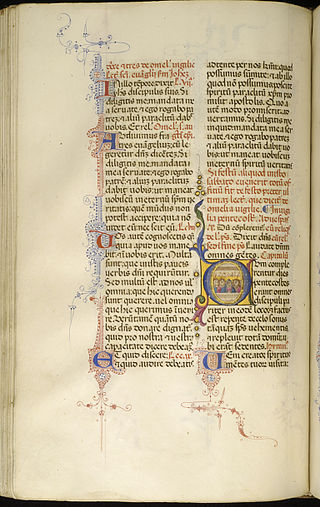
The Roman Breviary is a breviary of the Roman Rite in the Catholic Church. A liturgical book, it contains public or canonical prayers, hymns, the Psalms, readings, and notations for everyday use, especially by bishops, priests, and deacons in the Divine Office.

An antiphon is a short chant in Christian ritual, sung as a refrain. The texts of antiphons are the Psalms. Their form was favored by St Ambrose and they feature prominently in Ambrosian chant, but they are used widely in Gregorian chant as well. They may be used during Mass, for the Introit, the Offertory or the Communion. They may also be used in the Liturgy of the Hours, typically for Lauds or Vespers.

Vespers is a liturgy of evening prayer, one of the canonical hours in Catholic, Eastern Orthodox, Oriental Orthodox, and Lutheran liturgies. The word for this prayer time comes from the [vesper, meaning "evening".

In the practice of Christianity, canonical hours mark the divisions of the day in terms of fixed times of prayer at regular intervals. A book of hours, chiefly a breviary, normally contains a version of, or selection from, such prayers.

Queen of Heaven is a title given to the Virgin Mary, by Christians mainly of the Catholic Church and, to a lesser extent, in Anglicanism, Lutheranism, and Eastern Orthodoxy. The title has long been a tradition, included in prayers and devotional literature and seen in Western art in the subject of the Coronation of the Virgin from the High Middle Ages, long before it was given a formal definition status by the Church.

"Ave maris stella" is a medieval Marian hymn, usually sung at Vespers. It was especially popular in the Middle Ages and has been used by many composers as the basis of other compositions.

Compline, also known as Complin, Night Prayer, or the Prayers at the End of the Day, is the final prayer liturgy of the day in the Christian tradition of canonical hours, which are prayed at fixed prayer times.

The Litany of the Blessed Virgin Mary is a Marian litany originally approved in 1587 by Pope Sixtus V. It is also known as the Litany of Loreto, after its first-known place of origin, the Shrine of Our Lady of Loreto (Italy), where its usage was recorded as early as 1558.

"Regina caeli" is a musical antiphon addressed to the Blessed Virgin Mary that is used in the liturgy of the Roman Rite of the Catholic Church during the Easter season, from Easter Sunday until Pentecost. During this season, it is the Marian antiphon that ends Compline and it takes the place of the traditional thrice-daily Angelus prayer.

The "Salve Regina", also known as the "Hail Holy Queen", is a Marian hymn and one of four Marian antiphons sung at different seasons within the Christian liturgical calendar of the Catholic Church. The Salve Regina is traditionally sung at Compline in the time from the Saturday before Trinity Sunday until the Friday before the first Sunday of Advent. The Hail Holy Queen is also the final prayer of the Rosary.

Marian hymns are Christian songs focused on Mary, mother of Jesus. They are used in both devotional and liturgical services, particularly by the Roman Catholic, Eastern Orthodox, Oriental Orthodox, Anglican, and Lutheran churches. They are often used in the month of May devotions. Some have also been adopted as Christmas hymns. Marian hymns are not popular among some Protestants, as they see Marian veneration as idolatry. However, the practice is very common among Christians of Catholic traditions, and a key component of the Eastern Orthodox liturgy. There are many more hymns to Mary within the Eastern Orthodox yearly cycle of liturgy than in Roman Catholic liturgy.

The Liturgy of the Hours, Divine Office, or Opus Dei are a set of Catholic prayers comprising the canonical hours, often also referred to as the breviary, of the Latin Church. The Liturgy of the Hours forms the official set of prayers "marking the hours of each day and sanctifying the day with prayer." The term "Liturgy of the Hours" has been retroactively applied to the practices of saying the canonical hours in both the Christian East and West–particularly within the Latin liturgical rites–prior to the Second Vatican Council, and is the official term for the canonical hours promulgated for usage by the Latin Church in 1971. Before 1971, the official form for the Latin Church was the Breviarium Romanum, first published in 1568 with major editions through 1962.

Beneath Thy Protection is an ancient Christian hymn and prayer. It is one of the oldest known Marian prayers and among the most ancient preserved hymns to the Blessed Virgin Mary that is still in use. A papyrus containing it has been dated as early as the mid 3rd century by some scholars. The hymn is well attested among the believers of the Catholic Church, the Eastern Orthodox Church and Oriental Orthodoxy.

"Alma Redemptoris Mater" is a Marian hymn, written in Latin hexameter, and one of four seasonal liturgical Marian antiphons sung at the end of the office of Compline.
The Little Office of the Blessed Virgin Mary, also known as Hours of the Virgin, is a liturgical devotion to the Blessed Virgin Mary, in imitation of, and usually in addition to, the Divine Office in the Catholic Church. It is a cycle of psalms, hymns, scripture and other readings.
A Catholic order liturgical rite is a variant of a Catholic liturgical rite distinct from the typical ones, such as the Roman Rite, but instead specific to a certain Catholic religious order.

The veneration of Mary in the Catholic Church encompasses various devotions which include prayer, pious acts, visual arts, poetry, and music devoted to her. Popes have encouraged it, while also taking steps to reform some manifestations of it. The Holy See has insisted on the importance of distinguishing "true from false devotion, and authentic doctrine from its deformations by excess or defect". There are significantly more titles, feasts, and venerative Marian practices among Roman Catholics than in other Western Christian traditions. The term hyperdulia indicates the special veneration due to Mary, greater than the ordinary dulia for other saints, but utterly unlike the latria due only to God.

Catholic Marian music shares a trait with some other forms of Christian music in adding another emotional dimension to the process of veneration and in being used in various Marian ceremonies and feasts. Marian music is now an inherent element in many aspects of the veneration of the Blessed Virgin Mary in Catholic Mariology.

Ave Regina caelorum, WAB 8, is a motet composed by Anton Bruckner in c. 1886.
George Herbert Palmer was an English Anglo-Catholic priest, musicologist, organist, and expert on plainchant, particularly of the Sarum Use. Named after the priest and poet George Herbert, he was ordained a priest in Chester in 1871 and later was organist of St Margaret's Church in Toxteth Park, Liverpool, and St Barnabas, Pimlico, London. He helped found the Plainsong and Medieval Music Society (PMMS) in 1888. The majority of his extensive editions of liturgical music and texts were produced by the PMMS and the Community of St Mary the Virgin at Wantage in Oxfordshire. He was notable and influential for his musically sensitive translations of Latin hymns into English.



















